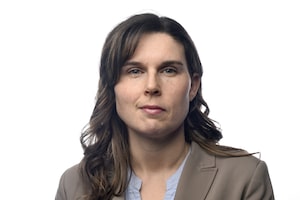A group of elite players has filed a lawsuit in Canada challenging plans to play the 2015 Women's World Cup on artificial turf. The players, led by U.S. women's national team forward Abby Wambach, filed Wednesday, Oct. 1, 2014, in the human rights tribunal of Ontario next week, attorney Hampton Dellinger said.Rick Bowmer/The Associated Press
A coalition of female World Cup soccer players have filed a strong gender discrimination complaint against FIFA and the Canadian Soccer Association, say two Canadian experts in human-rights laws.
- Cathal Kelly says the turf war is more about hurt feelings
- Everything you wanted to now about artificial turf
- Players will not boycott over the surface
The lawsuit filed this week to the Human Rights Tribunal of Ontario says that the Canadian Soccer Association (CSA) and FIFA are discriminating against women by holding the 2015 Women's World Cup on artificial-turf fields in Canada, because men have only ever played their World Cups on grass and will play their next two on the natural stuff as well. Two Canadian law professors say the CSA and FIFA will have to be creative and convincing if they hope to prove they have no choice but to put the women on turf.
The group of national team players, including U.S. stars Abby Wambach and Alex Morgan, and Germany's FIFA player of the year, Nadine Angerer, says it forces them to play their premier international event on a surface that changes the way the game is played.
They say it subjects them to unique injury risks and devalues their dignity, by insisting they settle for playing on a second-rate surface in front of thousands of spectators and a global television audience. They insist the tournament be moved to natural grass.
"It's a strong prima facie case that represents differential treatment without a justification under the Human Rights Code," said Michael Lynk, a law professor at the University of Western Ontario. "FIFA and CSA would have to argue that artificial turf is equivalent to and not more harmful than grass and there's no discrimination being perpetuated on the women. Or they would have to argue that the cost of complying with equal treatment would be so great it would cripple the organization, or that they couldn't install premier grass fields in time for the tournament."
Margot Young, professor of law at the University of British Columbia, calls it a "classic case of discrimination."
"It's like saying to Olympic hockey players, 'Men, you play on ice. Women, you play on slush,'" Prof. Young said. "There's concrete harm and symbolic harm, like harm to dignity. It's not hard to see the discrimination here; you don't have to go to subtle impact or indirect effects. It's clear – for elite men, they did one thing; for elite women, something else. But these cases are never slam dunks, but you hope the law will see it for what it is. "
While the U.S and Canadian firms representing the players pro bono have been very vocal with press releases, interviews and a player teleconference, FIFA and the CSA have so far been quiet – beyond site visits to the venues this week where they have reiterated that there is no Plan B. The Human Rights Tribunal told FIFA and CSA they must respond by next Thursday. The players have asked for the tribunal to expedite a hearing because of the fast-approaching June, 2015, tournament.
"I would expect FIFA and the CSA to quickly start raising the temperature of the public debate through press releases," Prof. Lynk said.
He said it will come down to both sides arguing whether turf is indeed inferior to natural grass. The women's complaint contains tweeted photos from top players of badly turf-burned legs. The players earned support on social media from the likes of NBA star Kobe Bryant and Hollywood actor Tom Hanks.
Their case draws on Canadian precedents, such as a 15-year-old female Toronto hockey player who was being denied the right to play with boys, or a girls' baseball team that was being given less travel funding than their male counterparts.
"Human rights tribunals in Canada often deal with many similar cases – usually girls fighting for better ice time, field time. It's an issue that keeps repeating," Prof. Young said. "The tribunal here will have the chance to fix concrete harm being done and put in the grass fields, but the larger impact would be to communicate the symbolic respect to the girls and women who play sports in this country."
 Rachel Brady
Rachel Brady